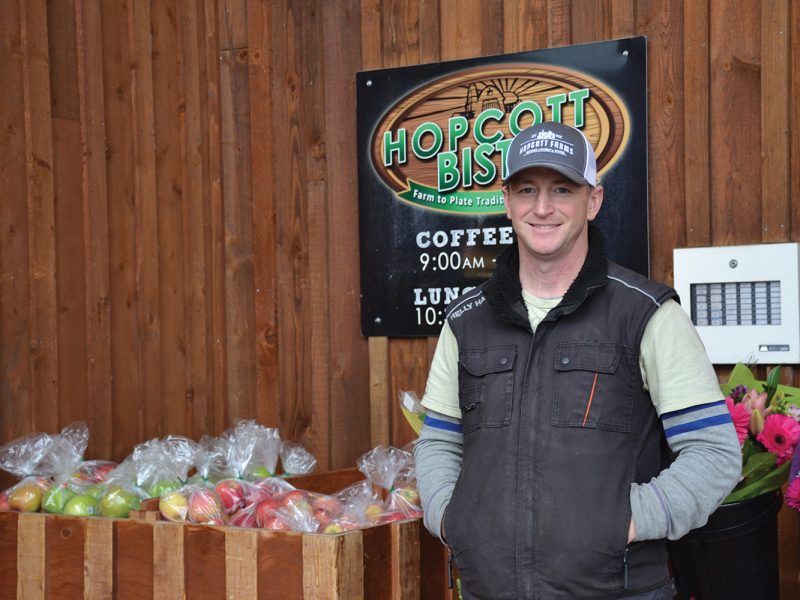PITT MEADOWS – A new Agriculture Viability Strategy is giving Pitt Meadows a renewed focus on actions benefiting farmers and agriculture.
Travis Hopcott, co-owner of Hopcott Farms and a member of the Pitt Meadows Agricultural Advisory Committee, praises the strategy, which applies to the city’s 6,900 hectares located in the Agricultural Land Reserve.
Hopcott played an active part in the plan’s creation and update of the previous plan adopted in 2000. The work took nine months.
“I was present for a couple of the drafts and then they used our store location as an opportunity to get feedback from those that live in Pitt Meadows,” he says. “They had a big display there, and questionnaires.”
Committee members like Hopcott contributed seven in-depth agriculture-based interviews that helped drive the strategy. There were also written surveys for those in agriculture and a different version of the survey for others in the community. The Agricultural Land Commission and the BC Ministry of Agriculture and Food provided input on the draft plan.
While most of the farms in Pitt Meadows are large-scale commercial operations, the study represents all agriculture sectors, including small, mixed-use farms.
Hopcott believes the new strategy will help connect the municipality with farmers in a more direct and meaningful way.
Upland Agriculture Consulting principal Ione Smith was lead consultant on the project and agrees.
“Pitt Meadows was already leaps and bounds ahead of some of the other municipalities that we’ve worked with,” she says. “[It] was really fantastic to have that level of support at the outset.”
A major part of the support was the city’s project manager for agriculture and environment, Michelle Baski.
“Our last agricultural plan is from the year 2000,” Baski explains. “It needed to be updated because of the changing agricultural sector in Pitt Meadows and the changing environment.”
The strategy is intended to guide the community’s relation to agriculture for the next five to 10 years. It outlines five goals, including protect farmland for farming; plan and manage infrastructure assets; support economic viability; help agriculture adapt to challenges and “help the community support and be proud of agriculture in Pitt Meadows.”
Baski says each of the goals have strategies and recommended actions and these cascade to specific recommended actions. When looking at infrastructure, for example, one of the strategies is to create an agriculture water study.
“We are looking to do a water study this year,” she says, noting that Pitt Meadows has secured funding for the project from the Investment Agriculture Foundation of BC. “That would be an example of an action that would support that goal.”
Each strategy includes a timeline of short (one to two years), medium (three to five years) or long (six to 10 years) in terms of implementation.
The document also recognizes existing ongoing activities in the community that back agriculture, such as supporting the Agricultural Advisory Committee and ensuring it continues to serve as an advisory board for the city.
“We leaned heavily on our Agricultural Advisory Committee in creating this,” says Baski. “We’re hoping that it will serve them well and that it will serve the community well.”
She recognizes that no community is in a silo when it comes to the agricultural needs municipal governments must address. This was considered in the strategy’s creation.
“A lot of the issues that we’re hoping to tackle are applicable to many other cities across the province,” she says. “We’re hoping that some of these actions can benefit the province as a whole.”
When actionable items fall outside of Pitt Meadows’ jurisdiction, the city will be an advocate to ensure the community’s agriculture sector has the support it needs.
Smith says some of the work is simply about ensuring agriculture is included actively rather than governments waiting for farmers to put their hands up.
“A lot of it is about creating that seat at the table,” she says. “Making sure agriculture isn’t neglected. Because the agriculture community is so busy, they don’t necessarily sign up.”
Farmers know that non-farmers generally don’t understand the challenges they face. Hopcott says he wasn’t surprised by how little the public knew.
“How we grow things and some of the challenges involved in producing a product or growing a product … there’s a lot of work that needs to be done with regards to awareness,” he says.
From a selfish perspective, he hopes the strategy will create more opportunities around agritourism, “to connect individuals with how the food is grown.”
“People love that type of experience so that’s what, personally, we’re looking forward to,” he says.
Hopcott also found some city staff were ignorant about farming practices and needs.
“We do have a water licence and we’ve had it for decades. But staff understanding about water, how much water [the farm uses] … there was a bit of a disconnect with infrastructure in that regard,” he says. “This whole process just gave everyone, including the farmers, a better understanding of agriculture in the city.”
Even without all the actionable activities, Hopcott sees the strategy as strengthening that important connection with the city.
“At the very minimum, the huge benefit is allowing the municipality an understanding of how important agriculture is,” he says. “It just connects the two different parties.”


 Pacific Agriculture Show kicks off
Pacific Agriculture Show kicks off